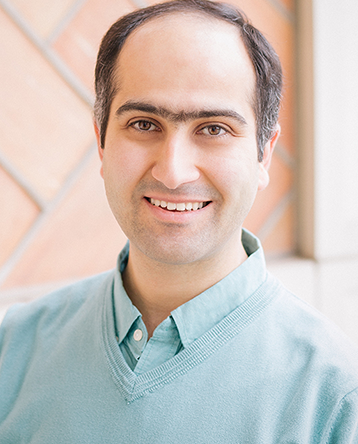Maysam Chamanzar
Dr. William D. and Nancy W. Strecker Professor, Electrical and Computer Engineering
Courtesy Appointment, Mechanical Engineering
Dr. William D. and Nancy W. Strecker Professor, Electrical and Computer Engineering
Courtesy Appointment, Mechanical Engineering

Maysam Chamanzar is a professor in the Department of Electrical and Computer Engineering and the Department of Biomedical Engineering at Carnegie Mellon University. His active areas of research are at the interface of photonics, bioMEMs, and neuroscience. Using basic principles of physics and advanced engineering techniques, Chamanzar's group is designing and implementing novel devices and methods to address outstanding needs in biology and medicine. His main application areas of interest are neuroscience and biophotonics. His research on neuroengineering includes developing next generation multimodal (acousto-opto-electrical) neural interfaces to understand the neural basis of brain function and realize functional brain-machine interfaces. The biophotonics front is focused on developing efficient hybrid photonic-plasmonic-fluidic on-chip systems for point of care diagnostics, environmental monitoring, imaging, and spectroscopy. The scope of research encompasses theoretical design and simulation, fabrication and packaging, experimental benchtop characterization, as well as in vivo, in vitro, and ex vivo tests on biological systems.
Chamanzar received his Ph.D. in Electrical and Computer Engineering from Georgia Tech in 2012. He was with the EECS department at University of California Berkeley as a postdoc researcher and later as a research scientist before joining CMU. Chamanzar has published more than 25 peer-reviewed journal and conference papers, and he holds three pending patents. He is the recipient of a number of awards, including the SPIE research excellence award and GTRIC innovation award, and became the finalist for the OSA Emil Wolf best paper award and Edison innovation award. He is the director of the Biophotonics and Neurotechnologies Lab and also the Shared Photonics Laboratory at Carnegie Mellon University. Chamanzar is also a faculty member of the Carnegie Mellon Neuroscience Institute (CMNI) and the Center for the Neural Basis of Cognition (CNBC).
2012 Ph.D., Photonics, Minor: Physics, Georgia Institute of Technology
2008 MS, Electronic Microsystems, Georgia Institute of Technology
2005 MS, Microwaves and Optics, Sharif University of Technology
2003 BS, Communications Engineering and Electronics Engineering, Amirkabir University of Technology (Tehran Polytechnic)
CMU Engineering
Carnegie Mellon engineering researchers have designed the first microfabricated stainless steel neural probe that allows for safer, more accurate brain sensing.
CMU Engineering
Maysam Chamanzar shares his philosophy for success and happiness at the recent Center for Faculty Success Milestone Moment event.
CMU Engineering
The Dowd Engineering Seed Fund for Graduate Student Fellowships funds innovative research proposals.
CMU Engineering
When faculty and students in the College of Engineering create intellectual property, our culture supports their efforts to form startups.
CMU Engineering
A CMU-led project team secured an award of up to $42M from ARPA-H to accelerate the development of implantable bioelectronic devices that deliver patient-specific therapy and monitor disease status.
Pittsburgh Post-Gazette
A company co-founded by ECE’s Maysam Chamanzar received an NSF grant to develop surgical devices. These devices give real-time feedback to doctors during surgery to ensure proper implementation.
CMU College of Engineering
ECE faculty Franz Franchetti, Gianluca Piazza, Shawn Blanton, Maysam Chamanzar, and Vyas Sekar were awarded professorship titles in April and May 2021.
CMU Engineering
Four engineering faculty received NSF CAREER awards to support their education and research goals.
CMU Engineering
The team is creating a smart port to the brain that will use artificial intelligence to selectively stimulate and record from the brain.
Atoms Talk
ECE’s Maysam Chamanzar was quoted on Atoms Talk on an optical platform his team invented.
CMU Engineering
Maysam Chamanzar’s team has developed a new class of materials for optical biointerfaces.
Science Daily
BME/MSE’s Tzahi Cohen-Karni and ECE’s Maysam Chamanzar were featured in Science Daily for their new technology that enhances scientists' ability to communicate with neural cells using light.